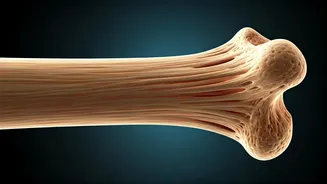Understanding Bone Loss
Bone loss, often silent in its initial stages, is a common concern as people age. It is a natural process where the body starts losing bone mass faster
than it can replace it. The severity of bone loss varies among individuals, depending on factors such as genetics, nutrition, and lifestyle choices. Identifying bone loss early through regular check-ups is essential to implement preventative measures. Bone density tests, like DXA scans, measure bone mineral density, assisting doctors in determining bone health and potential risks of fractures. Consulting with a healthcare professional allows for personalized assessment and the creation of a tailored plan to address bone loss effectively. This proactive approach ensures appropriate intervention, reducing the chances of developing severe conditions like osteoporosis. Awareness is crucial. Bone health should be part of a holistic health approach.
Dietary Adjustments Needed
Nutrition plays a vital role in preserving bone strength. Incorporating calcium-rich foods is fundamental, with dairy products like milk, yogurt, and cheese being excellent sources. Non-dairy alternatives, such as fortified plant-based milk (soy, almond) and leafy green vegetables like spinach and kale, are equally beneficial. Vitamin D, which aids calcium absorption, is another critical nutrient. Adequate sunlight exposure helps the body produce vitamin D, but supplementation may be necessary, especially in regions with limited sunlight or for individuals with deficiencies. Consider vitamin D-rich foods such as fatty fish (salmon, tuna), egg yolks, and fortified cereals. A balanced diet incorporating various nutrients like magnesium, vitamin K, and phosphorus also contributes to maintaining strong bones. Limit the intake of processed foods, excessive caffeine, and alcohol, as they can negatively affect calcium absorption. Consulting a nutritionist will offer tailored advice to optimize dietary intake for bone health and overall wellness.
Exercise for Bone Health
Regular physical activity is an effective way to improve and maintain bone density. Weight-bearing exercises, such as walking, jogging, dancing, and stair climbing, are particularly beneficial, as they put stress on bones, stimulating the creation of new bone tissue. Resistance exercises, including weightlifting and using resistance bands, also contribute to bone strengthening by causing muscle contractions that pull on bones. Aim for at least 30 minutes of moderate-intensity exercise most days of the week. Incorporate a variety of exercises to challenge different parts of the body. Before starting any exercise program, especially if you have existing health issues, consulting a healthcare professional is crucial. Consider working with a fitness trainer to develop a customized exercise routine that suits individual needs and fitness levels. Consistency in exercise promotes long-term bone health and overall physical fitness, making a positive impact on your quality of life.
Lifestyle Habits Matters
Certain lifestyle choices can significantly influence bone health, positively or negatively. Smoking, for example, is linked to a higher risk of bone loss and fractures. Quitting smoking is crucial for overall health and bone strength. Excessive alcohol consumption can also impede bone health, and it's best to consume alcohol in moderation. Maintaining a healthy weight is another key factor. Being underweight can increase the risk of bone loss, while obesity can lead to other health complications that indirectly affect bone health. Getting enough sleep, managing stress, and maintaining a regular daily routine are important aspects of overall health, which in turn impact bone health positively. Implementing these changes will help in building stronger, healthier bones, thus improving overall quality of life.
Supplements Considerations
While a balanced diet is the primary source of nutrients, supplements can play a supporting role. Calcium and vitamin D are commonly used supplements to help maintain bone density, particularly when dietary intake is insufficient. Before taking any supplements, consult with a healthcare professional to determine appropriate dosages and avoid potential interactions with other medications. Ensure you choose reputable brands and supplements that meet quality standards. In addition to calcium and vitamin D, other supplements, such as vitamin K2, magnesium, and boron, may have benefits for bone health, but the evidence supporting their effectiveness is not as strong. The use of supplements is not a quick fix; they work best when combined with dietary and lifestyle modifications. Always prioritize food-first nutrition and approach supplements with a comprehensive, well-informed strategy guided by healthcare professionals.















